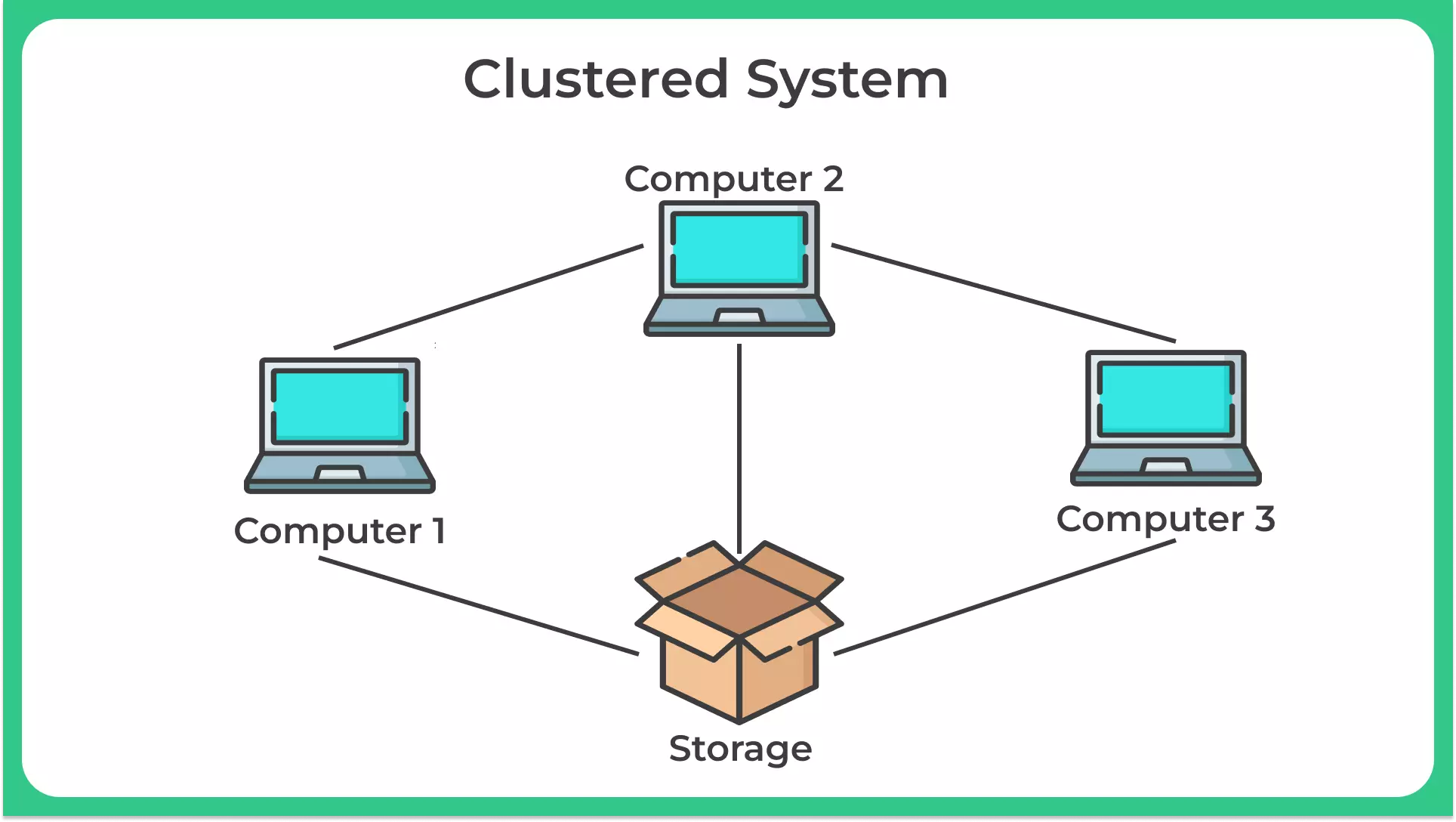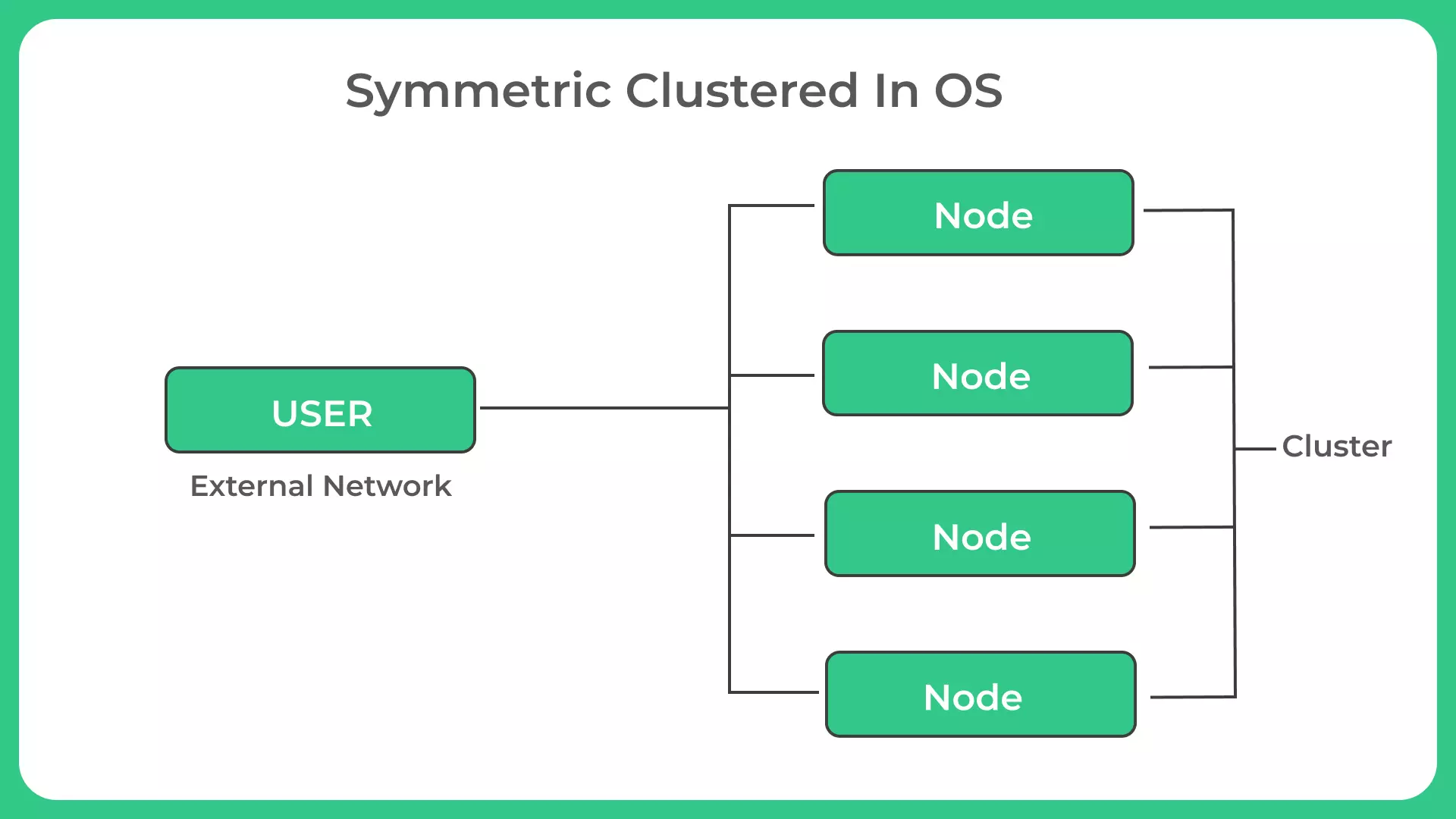Clustered System in OS
Overview of Cluster System
In the world of operating systems (OS), clustered systems play a significant role in enhancing reliability and performance. These systems provide a framework where multiple computers work together as a unified entity to handle tasks efficiently.
In this article, we will explore the concept of clustered systems, their types, benefits, components, working principles, examples, challenges, and considerations.

Introduction of a Clustered System
A clustered system refers to a group of interconnected computers, or nodes, that collaborate closely to perform tasks in parallel. These nodes work together as a single system, sharing resources and distributing workload effectively. By leveraging the combined power of multiple machines, clustered systems achieve high availability, scalability, and improved performance.
Types of Clustered Systems
Clustered systems come in various forms, each tailored to specific requirements. Let’s delve into the three common types of clustered systems:
- High Availability Clusters: High availability clusters focus on providing continuous operation even in the face of hardware or software failures. They ensure that critical services remain accessible by automatically switching to a redundant node when a failure occurs. This type of clustering is widely used in mission critical applications where downtime can have severe consequences.
- Load Balancing Clusters Load balancing clusters distribute incoming workload evenly across multiple nodes, optimizing resource utilization and preventing bottlenecks. By intelligently allocating tasks, these clusters improve performance and handle traffic spikes gracefully. Load balancing clusters are commonly employed in web servers, where high traffic volumes need to be handled efficiently.
- Failover Clusters: Failover clusters are designed to provide seamless failover in case of node failures. When a node becomes unavailable, another standby node takes over its responsibilities to ensure uninterrupted operation. Failover clusters are commonly used in database systems and critical applications that require uninterrupted service.

Several well-known clustered systems are widely used across various industries. Let’s explore a few notable examples:
- Microsoft Windows Server Failover Clustering Microsoft Windows Server Failover Clustering enables high availability and automatic failover for Windows-based applications and services. It ensures that critical workloads remain accessible, even if individual servers or services experience failures.
- Linux-HA Linux-HA, or Linux High Availability, provides a framework for building highly available Linux clusters. It offers various tools and resources to configure and manage failover and load-balancing clusters.
- Apache Hadoop Apache Hadoop is an open-source framework used for processing and analyzing large datasets across a cluster of computers. It provides fault tolerance and scalability, making it suitable for big data processing and analytics.

Importance of Clustered System in OS
- High Availability: Clustered systems reduce downtime by allowing one node to take over if another fails.
- Scalability: They allow easy addition of nodes to handle increased load without disrupting the system.
- Improved Performance: Workloads can be distributed across multiple systems, enhancing overall performance.
- Resource Sharing: Nodes in a cluster can share resources (like storage), making operations more efficient.
- Fault Tolerance: They ensure system reliability by handling hardware or software failures gracefully.
How Clustered Systems Work
Clustered systems employ specialized algorithms and protocols to distribute workload, monitor node health, and ensure efficient task execution. These systems leverage the power of parallel processing to handle complex tasks by dividing them into smaller subtasks that can be executed concurrently across multiple nodes.
Conclusion
Clustered systems in operating systems provide a powerful way to enhance reliability and performance by leveraging the collective strength of multiple nodes. These systems offer increased availability, scalability, and improved performance, making them a valuable asset in various domains.
However, they require careful configuration, management, and consideration of potential challenges to realize their full potential.
FAQs
Clustered systems offer better reliability and efficiency by combining multiple computers to act as a single unit. This minimizes downtime and boosts system performance.
If a node fails, another takes over its workload automatically. This ensures continuous operation without user disruption.
Yes, load balancing clusters are ideal for web traffic as they distribute requests evenly. This prevents server overload and keeps websites responsive.
Nodes in a cluster communicate through high speed interconnects like Ethernet. These links allow fast data sharing and coordination.



Login/Signup to comment